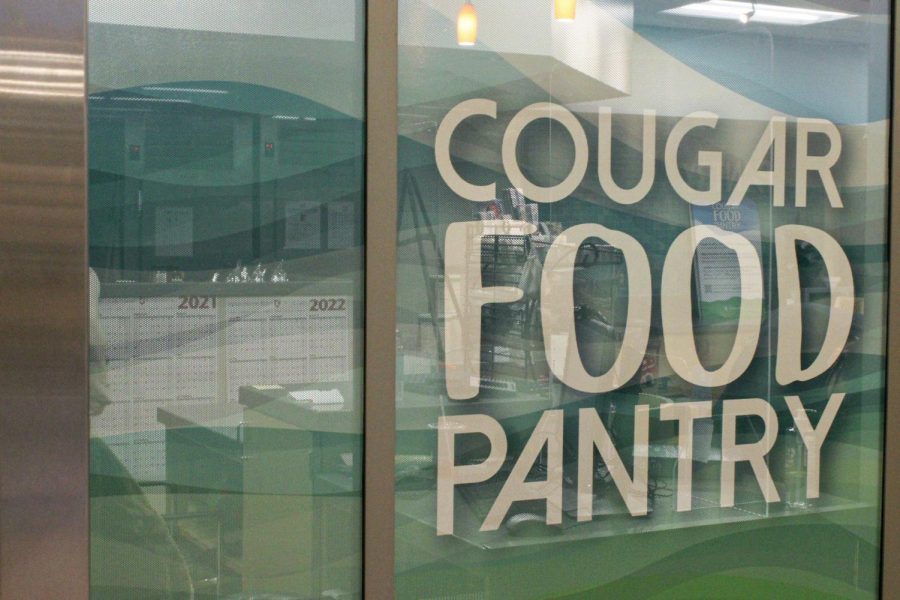Cougar Food Pantry continues growing, feeding students
New position created to work with community partners; 157 food boxes distributed over winter break
The fee increase would raise the fee by $5 for graduate students.
January 12, 2022
The Cougar Food Pantry is thriving in its Compton Union Building location, almost a year since students created the five-dollar fee to support the pantry.
The Cougar Food Pantry is led by Shae McCarron, anthropology and human biology major and AmeriCorps Cougar Food Pantry director.
WSU alumnus Cristalina Ramirez said she works at the food pantry, along with three other assistants.
The four assistants are employees of the university and receive healthcare and other benefits, McCarron said.
The food pantry is sustained by its local partnerships, including a coalition of the 12 different food banks and food pantries in Whitman County, they said.
The pantry recently hired someone to work with the local community partners such as the Council on Aging and Human Services in Colfax, the Moscow Food Co-Op and Moscow-based Backyard Harvest. This new employee will help strengthen existing partnerships and seek out new ones, McCarron said.
Another one of the food pantry’s partners is the WSU Eggert Family Organic Farm which designated several hydroponic tables specifically to give fresh lettuce to the food pantry, Ramirez said.
An advisory board of four undergraduate students, two graduate students and several faculty members manages the food pantry’s budget, McCarron said. They facilitate the board meetings.
“We make sure that students are okay with [any food pantry-related financial decisions] by passing it on to students,” McCarron said.
The pantry distributed 157 boxes of groceries to students over winter break, providing approximately two to three meals a day worth of groceries for 10 days, they said.
ASWSU Senators Jelani Christopher and Nife Shola-Dare sponsored the legislation to create the student fee that supports the pantry, said Sean Doster, 2020-21 ASWSU vice president and fall 2021 graduate.
Senators Christopher and Shola-Dare introduced the measure at the onset of the COVID-19 pandemic in spring 2020, Doster said.
Prior to the fee, the pantry was sustained by the Office for Access and Opportunity, Women*s Center, Center for Civic Engagement and Office of the Dean of Students. Whitman County food banks and other individuals supported the food pantry with donations, according to the ASWSU referendum.
Student voters passed the five-dollar fee with a 70% majority, according to a WSU Insider article.
“That doesn’t happen very often when you have a student fee initiative passed and the next year it’s already there ready to go,” Doster said. “If you want to boil it down it was Cougs helping Cougs.”
McCarron said they had to choose between putting food on their table or continuing with school and had to drop out in 2013. They decided to go back to school during the pandemic and now attend and work at WSU.
“Having [a food pantry] as a resource is just monumental for my success and I hope every other student’s success too,” McCarron said.
McCarron met with Western Washington University on Monday to talk about WSU’s success as WWU explores creating their own university food pantry.
“I want every university to do this,” McCarron said. “I want to see Harvard giving free food to their students. Those kids work hard. We deserve it, you know.”
McCarron said their vision for the food pantry is to make it a staple of WSU.
“To make it essential in the mind and eyes of students and faculty on campus,” they said.
McCarron said a lot of students are not aware of the food pantry.
The pantry is located in a space in the CUB that used to be a market and every so often students will come in thinking it’s still the market, Ramirez said.
“It’s one of those fees that definitely everyone is happy about,” Ramirez said. “No one goes in [to the food pantry] mad that the market is not there anymore. They’re like, ‘oh this is kind of better than the market.’”
The pantry serves anywhere from 1,000 to 1,500 individual students each month, Ramirez said.
A larger budget also means the food pantry is able to support students with different needs including buying more culturally-specific food, Ramirez said.
McCarron worked with the Week of Welcome student orientation team to ensure new students were aware of the food pantry.
“Don’t be afraid to use it,” McCarron said. “It doesn’t matter if you have the money or not, sometimes you just need a rice crispy that’s not four dollars.”










